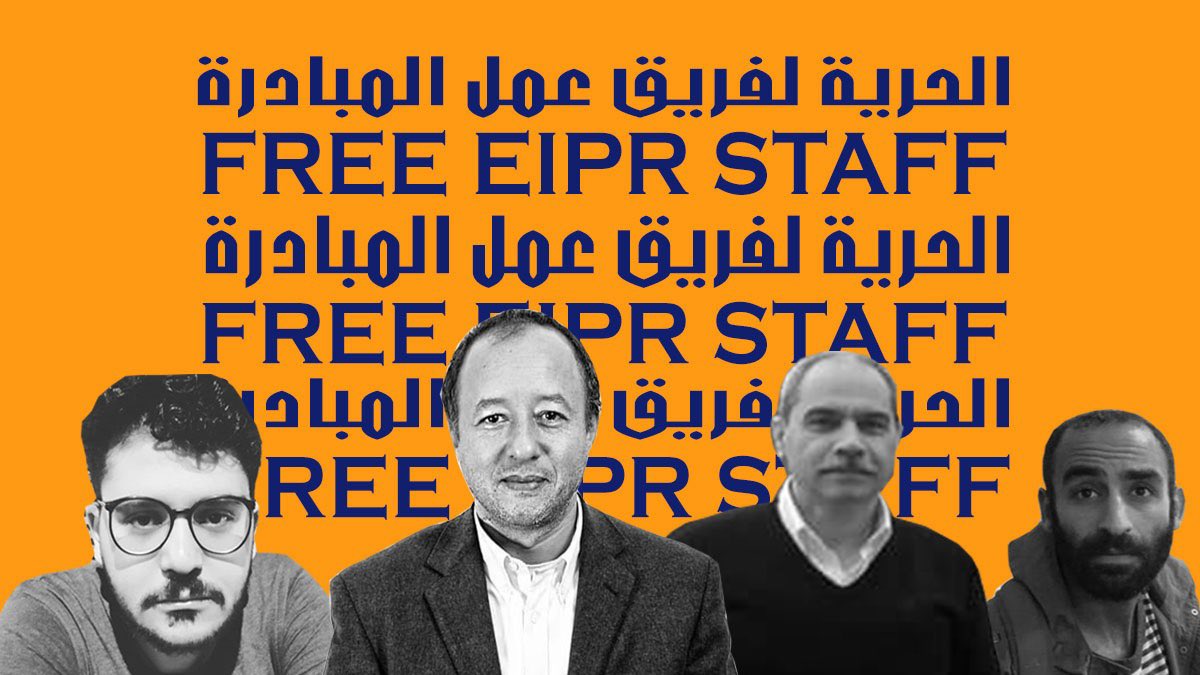Egypt: Geneva Council condemns the arrest of activists from the Egyptian Initiative for Personal Rights
Egyptian security forces arrested, on November 19, the executive director of the Egyptian Initiative for Personal Rights, Ali Jasser Abdel Razek, after raiding his home in Cairo and took him to an unknown location. One day before, authorities arrested Karim Ennarah, the director of criminal justice at the EIPR in Dahab, South Sinai. On November 15th, authorities arrested Mohamed Basheer, the administration manager of the organization from his home.
According to the Egyptian Initiative for Personal Rights (EIPR), he was questioned at a State Security premise outside Cairo, and after 24 hours had passed, Karim appeared afternoon on Thursday 19 November before the Supreme State Security Prosecution in Cairo. He was questioned for 4 hours before the prosecution ordered his detention for 15 days pending investigations in the case 855/2020, charged with the following: Joining a terrorist group with knowledge of its purposes, using a personal account on the internet to spread false information that undermine public security and broadcasting false news and statements that undermine public security and harm the public interest.
This took place following the arrest of Muhammad Bashir, the administrative director at EIPR, and the Supreme State Security Prosecution charged him with several charges, including “joining a terrorist group” and “committing one of the terrorism financing crimes” and ordered his detention for 15 days pending investigations after adding him to the same Case. These accusations were based on what the Egyptian security investigations described as “participation in prison riots to “undermine the bases of the Egyptian state and fight its stability.”
It is noteworthy that Case No. 855 of 2020 includes many detainees from months without trial, including human rights defenders and lawyers such as Muhammad al-Baqir and Mahienour al-Masry, and journalists such as Islam Muhammad and a professor of political science, Hazem Hosni. These arrests came in the context of a campaign of incitement and defamation against human rights institutions in a number of state-owned media outlets or known for their proximity to the security services, in parallel with the ongoing prosecution and arrest campaigns.
On August 25, 2020, the Fifth Terrorism Circuit Court in Cairo sentenced exiled Bahey el-Din Hassan, director of the Cairo Institute for Human Rights, to 15 years in prison on fabricated charges related to “insulting the judiciary” and “disseminating false news”
Geneva Council believes that these arrests and accusations are nothing but political decisions wrapped in a formal legal framework, as part of a systematic prosecution against human rights defenders in an attempt to silence voices that seek to uncover the escalating violations of human rights in Egypt.
This attack is a response to EIPR’s activism and works on a number of files, foremost of which is monitoring conditions in places of detention and prisons, especially under the COVID-19 pandemic, and its monitoring of the unprecedented surge in the issuance and execution of death sentences. This is in addition to EIPR’s work on monitoring and documenting incidents of sectarian violence and discrimination against women. The recent campaign seems to be also a direct response to a meeting held at EIPR’s headquarters on November 3rd with 13 ambassadors and accredited diplomats, who discussed ways to improve human rights conditions in Egypt.
Geneva Council for Rights and Liberties expresses its full solidarity with the Egyptian Initiative for Personal Rights and calls on the Egyptian authorities to immediately release the human rights detainees, quash the unfair sentences against them, and provide guarantees to facilitate the work of human rights organizations and human rights defenders in monitoring the human rights situation as signs of good governance. GCRL calls on the United Nations Special Rapporteur on the situation of human rights defenders, Michel Forrest, to activate the necessary international mechanisms to put pressure on the Egyptian state; to stop its prosecution of all human rights defenders, and to enable them to perform their work freely and responsibly.






